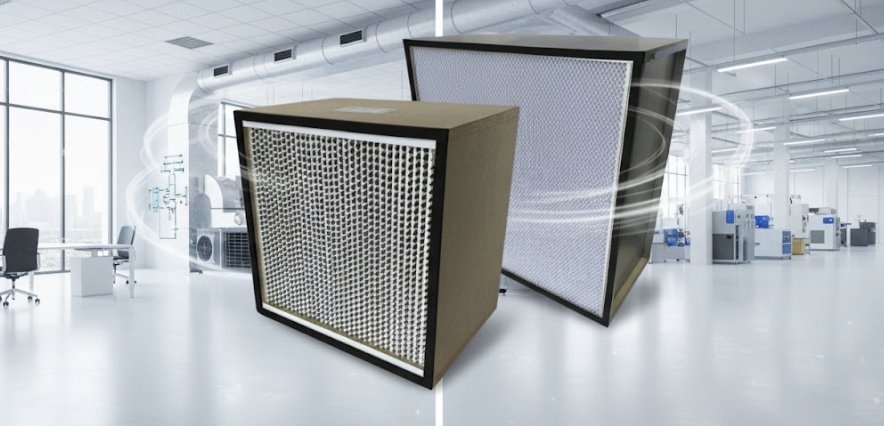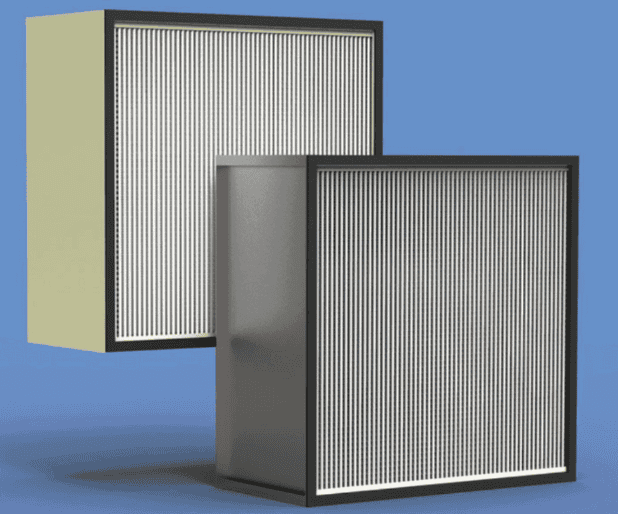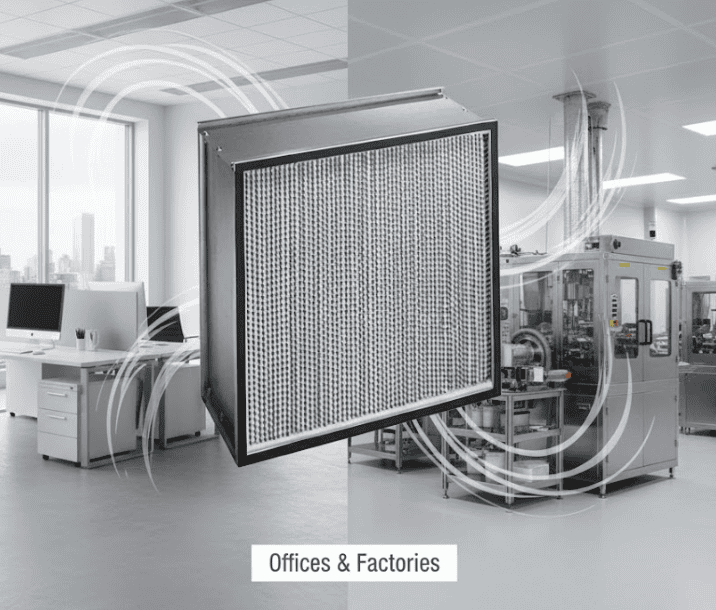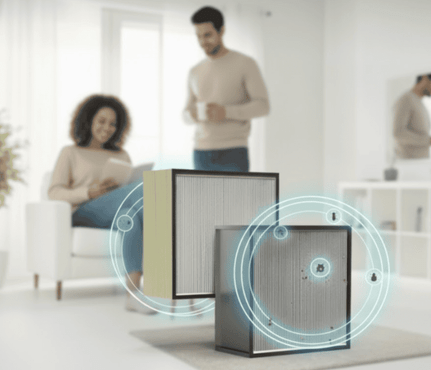Posted by Spycor LLC on Oct 28th 2025

When upgrading your commercial HVAC system to combat dust, allergens, and industrial fumes, selecting the right HEPA filter can transform indoor air quality and compliance. Commercial HEPA filters capture 99.97% of particles as small as 0.3 microns, making them indispensable for offices battling pollen, factories handling welding smoke, and hospitals preventing pathogen spread. If you're a facility manager or contractor ready to purchase durable, high-performance HEPA filters for your HVAC setup, this guide spotlights top options from Glasfloss and Koch Filter—affordable, robust solutions designed for 24/7 operation. With prices starting at $100 and features like metal frames for harsh environments, discover how these filters ensure cleaner air, lower energy costs, and OSHA compliance, helping you make the best buy for your business.
Why Commercial HEPA Filters Are a Must-
Buy for HVAC Upgrades
Commercial HEPA filters go beyond standard MERV-rated options by providing hospital-grade filtration in industrial and office settings. In HVAC systems, they trap fine particulates like silica dust from construction or VOCs from manufacturing, reducing employee sick days by up to 40%, according to ASHRAE studies. For factories, where OSHA mandates exposure limits for airborne hazards, a true HEPA filter (H13 or higher) ensures compliance without sacrificing airflow.
Unlike residential filters, commercial models feature pleated designs with high surface area for extended life (6-12 months) and low pressure drops to maintain system efficiency. Glasfloss and Koch Filter dominate the market with options like wood-frame for cost savings or metal-frame for corrosion resistance in humid plants. At $100-350 per unit, they're an investment that pays off through 10-20% energy savings from better airflow, per DOE estimates.
Key reasons to buy now:
- Superior Particle Capture: 99.97% efficiency for 0.3-micron contaminants like mold spores and fumes.
- Custom Sizing: Standard 24x24x12 inches fits most commercial HVAC; custom available.
- Durability: Galvanized steel frames withstand chemicals and high humidity.
- ROI Boost: Fewer filter changes and repairs cut annual costs by $500-1,000 per system.
For busy facilities, these filters integrate seamlessly into existing ducts, delivering immediate air quality improvements.

Glasfloss Commercial HEPA Filters:
Affordable Power for Everyday HVAC
Needs
Glasfloss leads in value-driven commercial HEPA filters, offering 99.97% efficiency in lightweight wood or sturdy metal frames. Priced at $150-250, its pleated glass media resists clogging, ideal for high-traffic buildings where pollen or pet dander circulates.
For factories, the Glasfloss Metal Frame HEPA excels with corrosion-resistant construction, handling fumes from welding or painting without degradation. Users on HVAC forums like Reddit's r/HVAC praise its "no-bypass" sealing, noting a 25% drop in pressure after 6 months—far better than generic filters. Bulk packs save 20%, making it a smart buy for multi-unit installs.
Highlights:
- Efficiency: True 99.97% at 0.3 microns; optional 99.99% ULPA upgrade.
- Frame Options: Wood for dry offices ($150); metal for industrial ($200+).
- Applications: Offices, schools, light manufacturing; easy drop-in replacement.
Invest in Glasfloss for reliable, budget-friendly filtration that keeps your HVAC humming.

Koch Filter Commercial HEPA Filters:
Heavy-Duty Performance for Demanding
Environments
Koch Biomax delivers premium commercial HEPA solutions for harsh conditions, like pharmaceutical plants or data centers requiring ISO cleanroom standards. The Koch Biomax HEPA Filter (24x24x12 inches) boasts 99.97% efficiency for 0.3 microns, with a gel-seal frame preventing leaks in high-velocity ducts. At $200-300, it's engineered for 1,500-2,500 CFM, minimizing energy spikes in large facilities.
In factories with chemical exposure, Biomax's metal-frame models resist corrosion, extending life to 12 months. A case study from a Midwest auto plant showed Biomax filters reduced fume complaints by 85%, boosting productivity. Their microglass media handles high dust loads without tearing, and optional antimicrobial coatings fight mold in humid zones.
Standout features:
- Advanced Sealing: Gel or knife-edge for zero bypass in critical apps.
- High Capacity: Up to 2,500 CFM; low 0.5-inch w.g. pressure drop.
- Certifications: Meets IEST-RP-CC001 for cleanrooms; UL 900 Class 1.
Choose Biomax for mission-critical HVAC where failure isn't an option.
Comparing Top Commercial HEPA Filters: Glasfloss vs. Koch for Your HVAC Buy
Selecting between Glasfloss and Koch depends on your facility's demands—here's a side-by-side for 2025 buyers.
| Filter Model | Efficiency | Frame Material | Size (inches) | Airflow (CFM) | Price Range | Best For |
|---|---|---|---|---|---|---|
| Glasfloss Magna Series | 99.97% |
Wood/ Metal |
24x24x12 | 1,000-2,000 | $150-250 | Offices/Factories |
| Koch Biomax | 99.97% | Metal/Gel-Seal | 24x24x12 |
1,500-2,500 |
$250-350 | Cleanrooms/Plants |
Glasfloss wins on affordability for general use; Koch for ultra-precision. Both offer custom sizes and bulk discounts at Spycor.com.
How to Install Commercial HEPA Filters in
Your HVAC System: Step-by-Step
Proper installation maximizes performance and longevity. Tools needed: gloves, ladder, and HVAC access panel.
- Power Down: Shut off HVAC at breaker; confirm no airflow.
- Remove Old Filter: Open access door; slide out existing filter, noting orientation (arrow toward airflow).
- Inspect Track: Clean debris; ensure tracks are straight for new filter fit.
- Insert New Filter: Slide in Glasfloss or Koch filter, arrow facing downstream. Secure door tightly.
- Test System: Power on; check for unusual noise or reduced flow. Monitor pressure drop with manometer.
- Schedule Changes: Set reminders for 6-12 months; inspect quarterly in dusty environments.
For metal-frame models, use gaskets if needed for tighter seals. Pro tip: Pair with pre-filters (MERV 8-13) to extend HEPA life by 50%.
Maintenance Tips: Maximizing Your
Commercial HEPA Filter Investment
Regular upkeep ensures peak efficiency. Vacuum pre-filters monthly to catch large debris; replace when pressure rises 0.5 inches w.g. HEPA filters aren't washable—dispose as hazardous if capturing fumes. In factories, use differential gauges for alerts.
Commercial HEPA filters from Glasfloss and Koch elevate HVAC performance, delivering clean air and compliance for your facility. With affordable pricing and easy integration, they're the smart buy for lasting efficiency.
Click Here to explore commercial HEPA filters at Spycor.com and secure your order now.

FAQ: Common Questions About Buying
Commercial HEPA Filters for HVAC
What efficiency do commercial HEPA filters provide?
99.97% at 0.3 microns for standard models; 99.99% for ULPA upgrades like Koch Polarex III.
Are metal-frame HEPA filters better for factories?
Yes, they resist corrosion from fumes; Glasfloss metal options suit humid or chemical-heavy environments.
How often should I replace commercial HEPA filters?
Every 6-12 months, based on usage; monitor pressure drop for optimal timing.
Can I use wood-frame HEPA in office HVAC?
Absolutely; Glasfloss wood frames are lightweight and cost-effective for dry, low-corrosion settings.
Do these HEPA filters fit standard HVAC sizes?
Yes, 24x24x12 inches is common; custom sizes available from Glasfloss and Koch.



